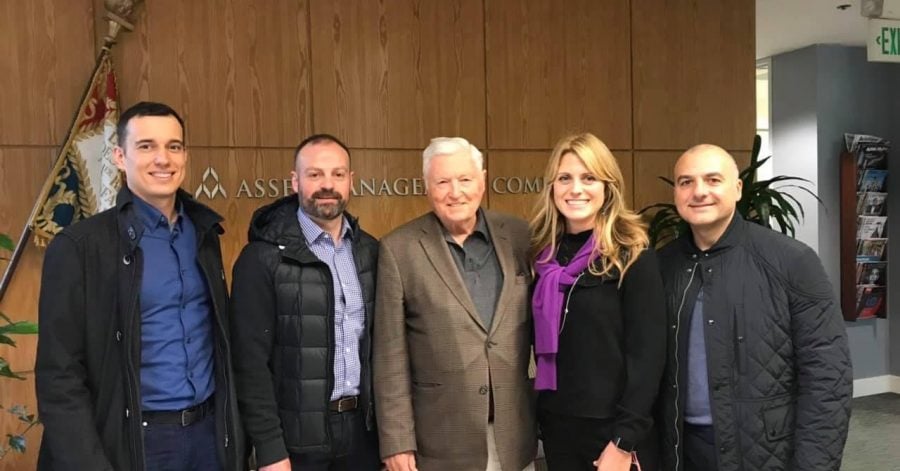What are the biggest challenges of international business expansion? Adapting to the new cultural environment, establishing a brand presence with the help of a decent go-to-market strategy, and creating strategic partnerships are only a part of the complex process of leveling out competitors. And what about going ahead of them?
The US entrepreneurial market offers many opportunities but is also known to be one of the hardest to break into. The help of people who are already part of the local ecosystem could be one way of making the transition easier and the realization of this fact has led to the emergence of one of the organizations that specialize in offering crucial expertise to Bulgarian startuppers. Based in Silicon Valley, Bulgaria Innovation Hub was founded in 2019 by Vassil Terziev, Bogomil Balkansky, Pavlina Yanakieva, and Ivan Dimov. The non-profit organization is entirely sponsored by its ecosystem partners in Bulgaria and in the US, including individual and corporate donors and supporters. For its short existence, it has built a diversified portfolio, including companies such as Dronamics, Cashwave, Endurosat, and FantasticStay who have all participated in its mentorship program.
Since completing the program, the 21 startups from the 2020 cohort have created 104 job positions and raised a total of $7.2M while attracting 1400 new customers. In spite of the pandemic and the virtual format of the BIH program, the early feedback from the 7 companies from the 2021 cohort give a cumulative grade of 4.75 out of 5, taking into account the knowledge learned and insights gained during the sessions.
“Up until two years ago, Bulgarian tech startups were leveraging the individual efforts and connections of the diaspora when turning to the US market. Many of us assisted in the process but without a strategic approach and a clear plan it was difficult to sustain the efforts. We founded Bulgaria Innovation Hub with the intention to close the gap and connect Bulgarian entrepreneurs to local partners, investors, and potential customers. As a mission-driven initiative, we are focused on elevating the Bulgarian startup ecosystem to global leadership, and promoting the country as a technology innovation hub to the VC community in Silicon Valley,” shares Pavlina Yanakieva, who is CEO and Executive Director of the diaspora-driven organization.
In this article, the Recursive team will familiarize you with the structure of the program, its mentors and will also present you the latest 7 startups that participated.
The accelerating force
In its essence, the BIH program consists of 27-28 workshops focused on go-to-market fundamentals – from what’s the right legal entity of a startup, through business planning and forecasting, and pitching and approaching for partnerships while building successful marketing and sales organizations. According to Yanakieva, knowledge in these areas is critical for startups as, for many Bulgarian founders, it is hard to get used to the dynamics of the US ecosystem. Another important topic the program builds knowledge upon is fundraising. For the purposes of their program, BIH works with a range of well-known mentors such as Todd Rulon-Miller, former VP of Netscape, Jerry Chen, Partner at Greylock, one of the oldest VCs in the USA, Jenn Wei, Senior Director Product Management at the cloud data management company Rubrik, and Anton Lenke, Global Director of Inside Sales at Appen. Successful Bulgarian entrepreneurs that mentor the startuppers include Bogomil Balkansky, partner at Sequoia Capital which is famous for its support for giants such as Apple and Google, Lidiya Dervisheva, Partner at Next47, Marina Hristova, Senior Director Marketing Strategy and Operations at AppDynamics, Simeon Simeonov, founder and CTO at Swoop, Stoyan Kenderov, Chief Product and Technology Officer at Plastiq, Deyan Vitanov, CEO of Chobolabs, Momchil Kyurkchiev Founder and CEO of Leanplum, Ivan Osmak, Founder and CEO of GtmHub, and others. The culmination of the 3-week long program is a pitching event in front of top-tier investors from the US ecosystem. In addition to the program, the companies receive free technology credits worth over $90K from companies such as AWS that ($10K), Segment ($50K), Stripe ($23K), GtmHub ($4K), Zendesk ($6K-65K), First Republic and others.
Apart from helping Bulgarian founders enter the US ecosystem, the team behind Bulgaria Innovation hub has another mission – to elevate Bulgaria as a technology and innovation hub, establish its presence among the local entrepreneurial network in the States. “Despite the pandemic, the Bulgarian startup ecosystem is thriving. Thanks to the resilience and perseverance of the entrepreneurs, many companies not only survived last year but even climbed to higher grounds. During that period few of our own companies EconicOne, Modeshift, FantasticStay, and Ondo successfully raised over $7.2M from the local VC funds, which is a testament to the agility and maturity of the ecosystem as a whole. The offshoring trend of large tech giants such as VMWare, Cisco, Oracle, HP, and others to Bulgaria further highlights the potential of the country as a global technology leader. A lot has changed in the last 10-15 years, and as the ecosystem continues to mature we’ll see a lot more #futureunicorns come out of this region,” comments Yanakieva.
The startup profile
A requirement of BIH for the early-stage tech startups is to have some pre-seed or seed funding from the local VCs in Bulgaria as this serves as a validation to US VCs that the companies have a potential for development. The annual revenue of the companies should also be between $1M and $10M, yet BIH has also worked with pre-revenue companies. Aside from the financials, a company should also have market traction, meaning they should already have some customer base, either in Bulgaria, Europe, the Middle East, or other countries and regions. When it comes to the human factor, Yanakieva shares that founders need to have an ambition for scaling globally. “An important part of the selection criteria is the mindset and ambition of the team. In particular, we look for people with a growth mindset – who are willing to learn and grow and are open to receiving feedback to improve and iterate. We seek visionaries and team players who think global and are willing to pay it forward by mentoring others and sharing the knowledge,” Yanakieva adds. As a whole, the program is designed for B2B companies, enterprise SaaS, yet the BIH team also has B2C companies in their portfolio such as Phyre and Ayo. In terms of industries, BIH has had companies from the fintech (Cashwave, Phos), edtech (Vedamo), pharmtech (Softgroup) and healthtech (FindMeCure, Kelvin, Ayo), aerospace and aviation (EnduroSat, Dronamics, Powerdrone) most recently with this cohort, industrial IoT (Amygda) and digital asset management (Scaleflex).
What is next for BIH?
Although in a virtual environment, Bulgaria Innovation Hub is to continue executing its biannual project. The next cohort will be in late September – early October and the applications can be submitted starting in May here. On the other side of the coin, BIH is also seeking seasoned mentors with strong entrepreneurial backgrounds and expertise in venture funding, building and leading teams in marketing, sales, product management, strategy, and partnerships to coach and mentor the startups. In addition to the continued program improvement and increased value add to the startups, the next goal of the organization is to expand its resources and geographic footprint in the next 2 years. BIH just finalized a three-year grant for $400K with America for Bulgaria Foundation. “The partnership with ABF is a critical milestone in our evolution as an organization, as it signals impact and growth. The support will accelerate our efforts to build a stronger bond between the entrepreneurial communities in Bulgaria and Silicon Valley, and help to elevate our startups to global leadership,” Yanakieva states. Another plan of the team is to spread new charters to other locations. The first city has not been decided yet, but entrepreneurial hubs such as New York, Boston, and London where there is a similar large diaspora and VC presence to the one in the Silicon Valley are potential options.
Which are the 7 companies from BIH’s latest cohort?
AYO has developed a solution that aims to improve people’s sleep by synchronizing the process that regulates the 24-hour cycle of sleep and waking hours of every individual. Its solution – AYO – is similar to a pair of glasses and imitates the Sun to regulate melatonin production, which is the hormone in charge of our sleeping patterns, thus regulating one’s biological clock. The device is connected to a mobile app in order to enable better tracking and individualization for every user.
Softgroup is a Bulgarian software company whose solution enables pharmaceutical specialists throughout the production and distribution chains to track and easily identify every product by creating a unique serial number for it. The company is trying to centralize data systems for different medications, so information by pharmaceutical experts can be uploaded and added to the cloud storage supported by the company.
Vedamo’s solution enables users to create and set up educational services all online. It includes everything from managing your curriculum of classes, through interacting with up to 50 people (students) and arranging your schedule.
Amygda – Amygda Labs offers an AI solution whose main goal is to use predictive analytics to discover any possible technical problems that can arise in complex systems that are heavily reliant on machines. The platform of the company offers centralized data on machines and their components while monitoring their condition to call out for any abnormalities that may cause a problem.
Phyre – the company offers a digital wallet through which users access their bank and loyalty cards directly, via an app. Founded in 2017, the fintech company raised €1.55M led by New Vision 3 VC fund and supported by the Bulgarian American Credit Bank.
Phos – the solution of the company adds new functionality to smartphones and smartwatches – namely, the devices can act as POS terminals, as long as they are NFC-enabled. A participant in Raiffeisenbank’s accelerator aimed at fintech startups, Phos attracted €1.3M led by New Vision 3.
Scaleflex – the company offers a cloud-stored solution that enables managing images on websites so that they can become faster and more pleasant for the user to work with. The Scaleflex solution also enables users to resize and distribute freely their imaged depending on the audience they are targeting.








